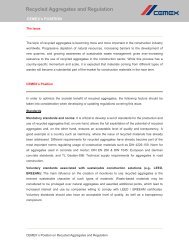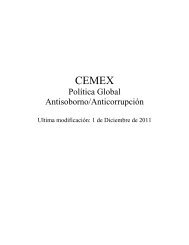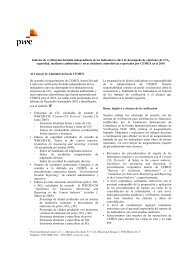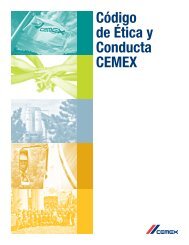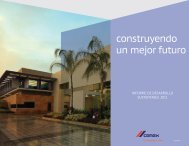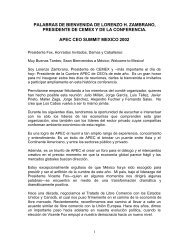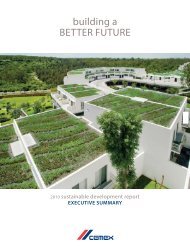building a STRONGER foundation - Cemex
building a STRONGER foundation - Cemex
building a STRONGER foundation - Cemex
You also want an ePaper? Increase the reach of your titles
YUMPU automatically turns print PDFs into web optimized ePapers that Google loves.
Antitrust Cases in Egypt. On October 4, 2007, all Egyptian cement producers (including CEMEX Egypt) were referred to the<br />
public prosecutor for an alleged agreement on price fixing. The country manager and director of sales of CEMEX Egypt were both<br />
named as defendants. The case was referred to criminal court on February 13, 2008, and the final court hearing was held on<br />
August 25, 2008. At this hearing, the court announced its decision imposing the maximum penalty of 10 million Egyptian Pounds<br />
(approximately U.S.$1.7 million as of April 30, 2011, based on an exchange rate of Egyptian Pounds 5.9549 to U.S.$1.00) on each<br />
entity accused. CEMEX Egypt was required to pay a fine of 20 million Egyptian Pounds (approximately U.S.$3.4 million as of<br />
April 30, 2011, based on an exchange rate of Egyptian Pounds 5.9549 to U.S.$1.00), since its two executives named above were found<br />
guilty. The case was appealed to the Court of Appeals, which confirmed the fine on December 31, 2008. We decided not to proceed<br />
with a further appeal to the Court of Cassation and paid the fine.<br />
On July 29, 2009, two Egyptian contractors filed lawsuits against four cement producers, including CEMEX Egypt, demanding<br />
compensation of 20 million Egyptian Pounds (approximately U.S.$3.4 million as of April 30, 2011, based on an exchange rate of<br />
Egyptian Pounds 5.9549 to U.S.$1.00) from the four cement producers (5 million Egyptian Pounds or approximately U.S.$839,644 as<br />
of April 30, 2011, based on an exchange rate of Egyptian Pounds 5.9549 to U.S.$1.00 from each defendant). The plaintiffs are using<br />
as a precedent the case mentioned in the prior paragraph, and as a main proof of their allegation, an Egyptian Court decision<br />
convicting all cement producers in Egypt of antitrust activities and price fixing. At the latest hearing for one of the cases, on April 24,<br />
2010 the court decided to refer the matter back to the prosecutor’s office for further investigation and for a report on the investigations<br />
to be presented at the next hearing, which was held on January 11, 2011, thereafter the case was dismissed and all charges against<br />
CEMEX Egypt have been dropped. The plaintiffs had 60 days to file their appeals, if any, to this ruling. The plaintiffs filed a<br />
challenge before the Court of Cassation. The Court has not yet scheduled the first hearing of Cassation. The other case had its last<br />
hearing on December 16, 2009, where the claimants requested the court to release CEMEX Egypt from the claim. On May 11, 2010,<br />
the court released CEMEX Egypt from the claim, and the case is now closed. These cases are the first of their kind in Egypt due to the<br />
recent enactment of the Law on Competition Protection and Prevention of Monopolistic Practices No. 3 in 2005. Even if we prevail in<br />
the ongoing case, these claims may have a material adverse impact if they were to become a precedent and may create a risk of similar<br />
claims in the future.<br />
Antitrust Cases in Florida. In October 2009, CEMEX Corp. and other cement and concrete suppliers were named as defendants<br />
in several purported class action lawsuits alleging price-fixing in Florida. The purported class action lawsuits are of two distinct types:<br />
The first type was filed by entities purporting to have purchased cement or ready-mix concrete directly from one or more of the<br />
defendants. The second group of plaintiffs are entities purporting to have purchased cement or ready-mix concrete indirectly from one<br />
or more of the defendants. Underlying all proposed suits is the allegation that the defendants conspired to raise the price of cement and<br />
concrete and hinder competition in Florida. On January 7, 2010, both groups of plaintiffs independently filed consolidated amended<br />
complaints substituting CEMEX, Inc. and some of its subsidiaries for the original defendant, CEMEX Corp. CEMEX and the other<br />
defendants moved to dismiss the consolidated amended complaints. On October 12, 2010, the court granted in part the defendants’<br />
motion, dismissing from the case all claims relating to cement and reducing the applicable time period of the plaintiffs’ claims. On<br />
October 29, 2010, the plaintiffs filed further amended complaints pursuant to the court’s decision. On December 2, 2010, CEMEX<br />
moved to dismiss the amended complaint filed by the indirect purchaser plaintiffs based on lack of standing. CEMEX also answered<br />
the complaint filed by the direct purchaser plaintiffs. On January 4, 2011, both the direct and indirect purchaser plaintiffs filed further<br />
amended complaints, which CEMEX answered on January 18, 2011. In March 2011, the direct and indirect purchaser plaintiffs filed<br />
motions for certification under Federal Rule of Civil Procedure 54(b), seeking the entry of final judgment pursuant to the court’s<br />
October 12, 2010 order so they may appeal the dismissals to the Court of Appeals for the 11th Circuit. The court denied those motions<br />
on April 15, 2011. CEMEX continues to believe that the lawsuits are without merit and intends to defend them vigorously.<br />
On October 26, 2010, CEMEX, Inc. received an Antitrust Civil Investigative Demand from the Office of the Florida Attorney<br />
General, which seeks documents and information in connection with an antitrust investigation by the Florida Attorney General into the<br />
ready-mix concrete industry in Florida. CEMEX is working with the Office of the Florida Attorney General to comply with the civil<br />
investigative demand, and it is unclear at this stage whether any formal proceeding will be initiated by the Office of the Florida<br />
Attorney General.<br />
Environmental Matters<br />
We are subject to a broad range of environmental laws and regulations in each of the jurisdictions in which we operate. These<br />
laws and regulations impose increasingly stringent environmental protection standards regarding, among other things, air emissions,<br />
wastewater discharges, the use and handling of hazardous waste or materials, waste disposal practices and the remediation of<br />
environmental damage or contamination. These standards expose us to the risk of substantial environmental costs and liabilities,<br />
including liabilities associated with divested assets and past activities, even conducted by prior owners or operators and, in some<br />
jurisdictions, without regard to fault or the lawfulness of the original activity.<br />
68



